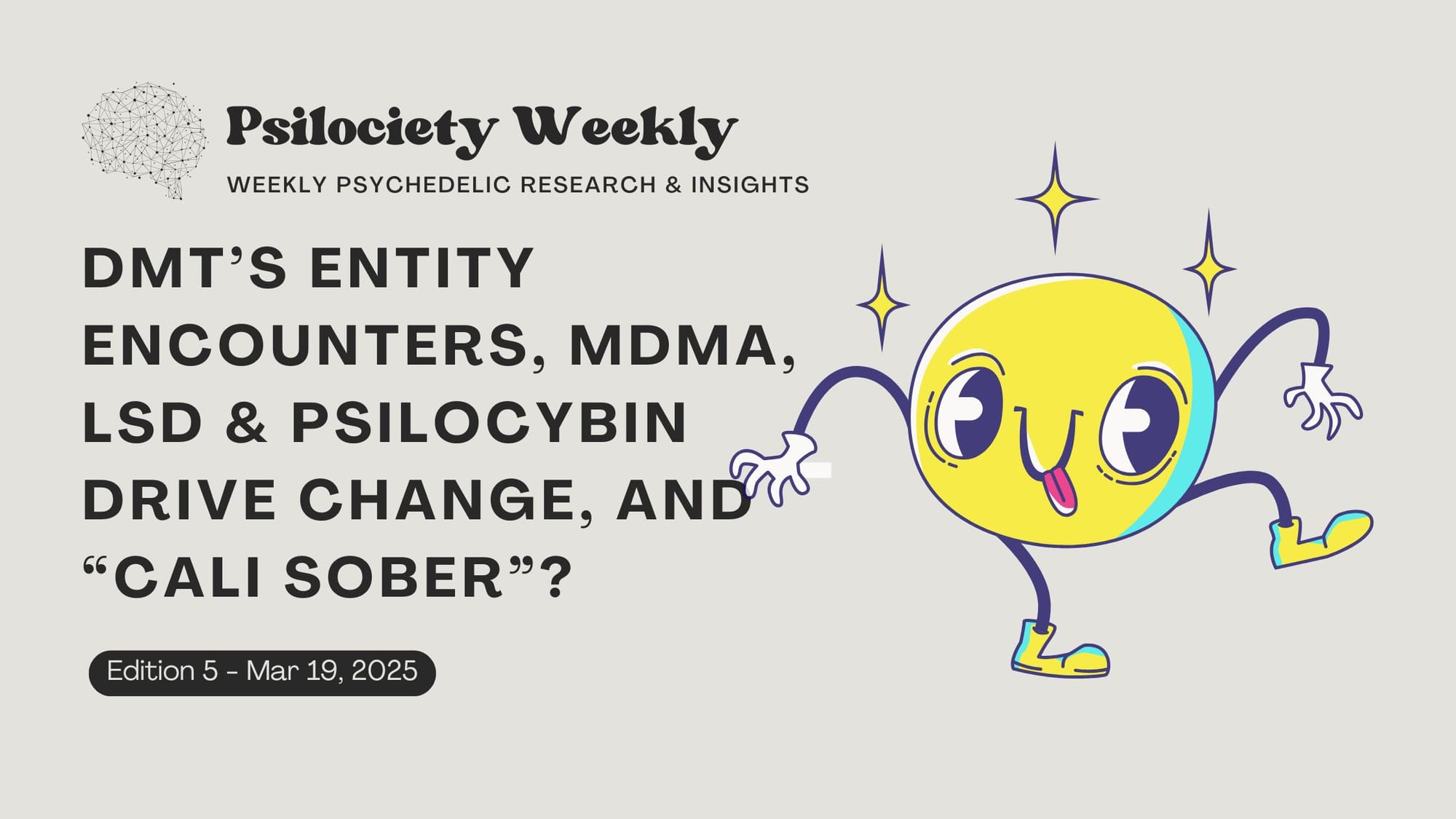Psilociety Weekly: DMT’s Entity Encounters, MDMA, LSD & Psilocybin Drive Change, and “Cali Sober”?
Explore DMT entity encounters, the neuroscience behind psychedelics, and the rise of the “Cali Sober” lifestyle in this week’s Psilociety Weekly.

🧠 This Week in Psychedelic Science
The latest from psychedelic research:
- Different extraction methods significantly impact psilocybin and psilocin yield, with ultrasonic bath extraction identified as the most effective approach. Read full summary 👉
- Individuals with a history of classic psychedelic use had a 25% lower likelihood of experiencing frequent severe headaches compared to non-users. Read full summary 👉
- Increased awareness and culturally informed research could improve the acceptance of psychedelic-assisted therapy within Māori healthcare frameworks. Read full summary 👉
- Psilocybin, MDMA, and LSD exhibit unique neurobiological effects that promote neuroplasticity, emotional processing, and therapeutic breakthroughs, making them promising candidates for treating psychiatric disorders. Read full summary 👉
- While preliminary clinical trials show promise for psychedelics in treating depression, challenges such as unblinding, expectancy effects, and regulatory complexities must be addressed in future studies. Read full summary 👉
🔬 Deep Dive: Featured Study of the Week
- Title: Entity and Environment Relationships in Psychedelic Experiences Resulting from Inhalation of N,N-Dimethyltryptamine
- Published In: Journal of Psychedelic Studies (2025)
- Key Finding: This study analyzed 150 narrative reports of DMT experiences and found consistent relationships between types of encountered entities and the environments they appear within. Some entities, such as humanoid figures, were most commonly seen in room-like settings, while mythological beings often appeared in pyramid or cosmic landscapes. The study suggests these patterns may provide insight into the structure of psychedelic perception and consciousness.
- Why It Matters: Understanding the patterns of entities and their associated environments in DMT-induced experiences may help researchers build predictive models of these altered states. This could assist in therapeutic applications, helping individuals navigate and integrate psychedelic encounters more effectively.
- Read More: Read full summary 👉
🎙️ Expert Insights
"One of the key effects of psychedelics is softening the ego. When the ego quiets down, there’s nothing between you and nature, or you and other people. That’s where the sense of connection comes from."
Michael Pollan from Can Psychedelics Heal Mental Trauma? — an interview with Oprah Winfrey.
Why it matters
Michael Pollan's insight highlights a crucial aspect of psychedelic therapy—the dissolution of the ego. In the context of mental health and spiritual growth, this effect allows individuals to experience deeper connections, reducing feelings of isolation and rigidity in thought.
Ego dissolution is linked to therapeutic breakthroughs in conditions like depression, PTSD, and addiction, making it a key focus in psychedelic research and therapy.
🌎 Psychedelics in the News
- Medibank Invests in Psychedelic Therapy: Medibank, an Australian health insurer, announced a $10 million investment in a psychotherapy program targeting acute mental health conditions such as PTSD. This initiative includes trials using MDMA and psilocybin, following the Therapeutic Goods Administration's approval for their use in specific treatments.
- "Cali Sober" Lifestyle Gains Popularity: A lifestyle trend known as "Cali Sober," where individuals abstain from alcohol but use psychedelics and other substances, has been gaining traction, particularly in Southern California. This approach is influenced by health concerns associated with alcohol consumption and a desire for alternative social experiences.
💡 Community & Resources
📚 Recommended Book - Psychedelic Outlaws by Joanna Kempner, PhD: details the remarkable story of the “Clusterbusters,” a group of chronic pain sufferers who turned to psilocybin to treat debilitating cluster headaches. Kempner explores their fight for recognition, the flaws in the medical system, and how their underground research helped shape modern psychedelic science.
🎙️ Podcast Recommendation - Should You Be Taking Psychedelics? with Jay Michaelson: Author and scholar Jay Michaelson joins The Psychedelic Podcast to discuss his shift from a long-standing meditation practice to a renewed focus on psychedelics. He explores how psychedelics, like psilocybin and MDMA, offer profound therapeutic and spiritual experiences, sometimes even leading to "accidental mystical experiences" for those seeking mental health relief.
📆 Upcoming event - Psychedelic Therapeutics & Drug Development Conference May 19 to 20, 2025, in San Diego, CA, gathers leading researchers and industry leaders to discuss challenges and opportunities in developing psychedelics for health conditions with unmet needs. Topics include treatments for disorders such as PTSD, anxiety, depression, and opioid use disorder.
🔎 Research Spotlight: Open Calls & Clinical Trials
Opportunities to participate in psychedelic research.
United States
- Treatment Resistant Depression Clinical Trial – Recruiting Now: currently recruiting patients for a clinical trial in Treatment Resistant Depression in Salt Lake City, Utah.
- Computer Game, Qualitative, and MEG/EEG Assessment of Serotonergic Psychedelics: The goal of this observational study is to learn how the brain's information processing changes during and following administration of serotonergic psychedelics for people with and without mental illness receiving serotonergic psychedelics through any clinical trial at Yale University
- Psilocybin with Psychological Support for Military Veterans and First Responders with Co-occurring PTSD & Alcohol Use Disorder: This Phase 2 clinical trial tests the safety, efficacy, and lasting effects of psilocybin (25 mg) with psychological support for 40 military veterans and first responders (ages 18-65) with both alcohol use disorder and PTSD. It is a double-blind, placebo-controlled study with an open-label extension.
- Psilocybin Brain Stimulation and Imaging Pilot Study: This open-label pilot psilocybin administration study investigates the influence of psilocybin on brain function and cognitive control functions in clinically and psychiatrically healthy volunteers.
United Kingdom
- Psychedelics and couples: A scientific research project on the psychological effects of taking MDMA/psychedelic substances with your romantic partner.
- Psychedelic drug being tested as treatment for heavy drinking: UCL researchers are conducting the largest psychedelic brain imaging study to date, testing DMT as a treatment to reduce problematic alcohol consumption. Participants will receive an intravenous dose of DMT, a placebo, or active control drugs alongside brief psychological support, with follow-ups over nine months to assess long-term effects on drinking behavior and brain function.

